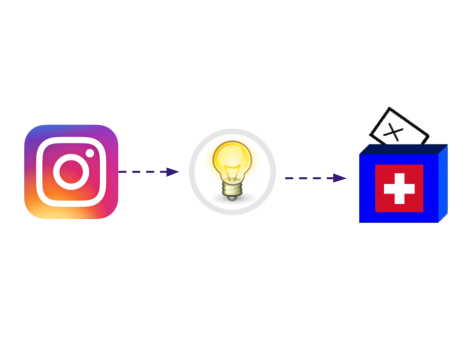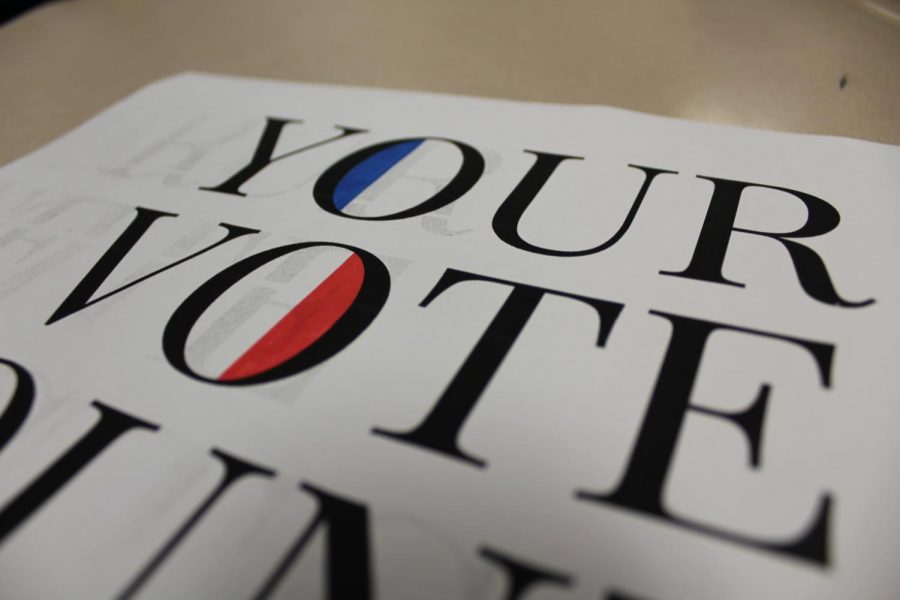Staff Editorial: Voting with the next generation
Political Change through Voting. To make their political voice heard, high school students who are of age cast their ballot and vote as their new responsibility as a citizen. However, for students who cannot vote yet, they can still inflict change by using social media and speaking out their opinions publicly.“We can reach out to our representatives and other people involved in politics to make a change in what we may not like within the policies. Anyone can make a difference, even though we may be young, especially through social media.” stated Junior Isabella Olivera.
December 1, 2018
Nearly every day, students walk into history classes and learn of current and past political debates. Even for classes such as Economics and World History, students still learn the views of political parties, how they came to be and how they affect our lives. How can we as teenagers affect some of these political issues?
The state of politics during this era is extraordinarily polarized. The media is constantly trying to persuade us to “their side”. The idea of politics has become more of a battle than a well- educated discussion. There are a lot of changes to be made in the realm of politics. The legal voting age for United States citizens is 18 years old. However, the results of these votes affect everyone regardless of age. Therefore, it’s the responsibility of every citizen, not just the adults, to express their opinions. In today’s day and age, students have a stronger voice via social media and the internet. It’s up to us to politically affect the world: the students. Students of-age should cast their ballots to make their voices heard. Even though most of us cannot vote, we don’t have to be 18 to actively participate in our democracy. The majority of the school can not vote yet, but these non-voting students still have a chance to impact the political world.
Teens assume that the elections are a process that happens above their heads, and that the consequences don’t affect them. However, this isn’t the case. Teens are still citizens; therefore, the result of these elections impact them. Consequently, it’s vital that teens not only vote, but make their voice heard regardless of voting ability. We feel that students with the right to vote should take advantage of it in order to change political status. If we want to see change in our government, we can start by simply casting our ballots. Based on www.nytimes.com,18-year-olds should register to vote early because it is studied that if they do not vote the first time, there is a small chance that they will vote regularly in the future. It is our job to know who we want to represent us and what we want to be a part of. By asserting our voices in school, we can stand firmly on our thoughts, and set ourselves up for an active future in politics. Students who feel becoming involved in the elections may want to rethink that policy; their impact on the elections is indirectly an impact on their future.
With just one ballot, the way an election turns out can be affected greatly. This is because our vote does matter. The majority of students who have the privilege to vote really take the right for granted. We feel that students with that right should take advantage of it in order to change political status. If we want to see change in our government, we can start by simply casting our ballots. In a recent video by ATTN, Obama explains seven reasons that young people often choose not to vote. We, the students, may use these excuses in the future, but we need to understand that voting can change the way our society works.
Junior Salena Petluri says that “I will utilize my ability to vote when I am eligible” because she believes that “the current trend of voting is towards older generations who may not have the best interests in mind for modern times.”
As high school students, we can also affect political decisions in more direct ways. For example, a very powerful tool known as social media can be used to invoke political change as almost all high schoolers can use it to reach out to the entire world. Social media is a huge part of the lives of teens. According to Thought Co., social media influences elections in many ways, including increased contact from candidates, free advertising, and viral campaigns. Teens can use social media to express their opinions on the candidates and their issues. Voters who see these posts will hear what the younger generation has to say and take their opinions into consideration. Even if the posts do not immediately change someone’s perspective, they will increase awareness and give the voters another point to think about before making their decisions.
The Youth Empowerment Camp suggests that teens use phones and social media to connect with eligible voters. “Even just posting a picture of yourself and your friends at a rally on your social media encourages those in your network to be aware of the election,” the article explains.
Social media posts, especially well-written ones, can skew people’s opinions. In fact, social media is one of the biggest offenders in our voting process. Social media was one of the most influential digital channels during the U.S. Presidential Election 2016. Reading one article on instagram about politics DOESN’T mean you are well educated in the aspect. In order to engage in political change, we must be informed. Multiple media outlets exist and are available for us to gain enough knowledge to actively engage in political discussion. These media outlets exist on the radio, cable television, online, and in print. There is no excuse for us to remain ignorant of the happenings in the world. By staying informed on the elections and expressing their opinion on them, teens can make the younger generation’s voice heard.

In contrast to social media, teens can use other outlets to let their voices be heard. At South Forsyth, the student council is based on real governments, it gives students a chance to exercise their decision making and leadership skills early, which is a most useful advantage for politics. Not only in school, you can get involved in your local polling location. As most of our SFHS is underage to vote, this group of teens are eligible to volunteer as a poll worker. This experience gives teens a perspective on voting and can help prepare teens for the day they can vote. In addition, these options give teens without social media a way to represent their political decisions.
Having this confidence and freedom to make choices for ourselves will help us in the future to develop better and increasingly fair political outcomes for everyone. We can and must do our best to invoke political change. We can achieve this by utilizing our social media use to make our voice heard. Through social media, we, as high school students, have the ability to share our views and opinions with those around us as well as with our representatives and other political figures. While it may seem that students, without the power to vote, are powerless and have no stance within the political world, we actually have many fields through which we can utilize our voices and make a difference in our world. New voters should look inward to find what morals they hold close to them and what they believe is important to the country as a whole before they choose a political side. Even though students might be registered Democrat or Republican, they and still vote for a member from the opposite party if they support their views.The benefit that comes from living in a democracy is that citizens have the freedoms to speak out against the government, propose new ideas and retaining our right to peacefully protest.
We can invoke political changes despite our age because we are the future and the next generation of voters. If we let our voices be heard, we can influence others to believe in our opinion and who we want as our leader. Factors such as education, jobs, and poverty affect us at our age, and we have the ability to speak out.





